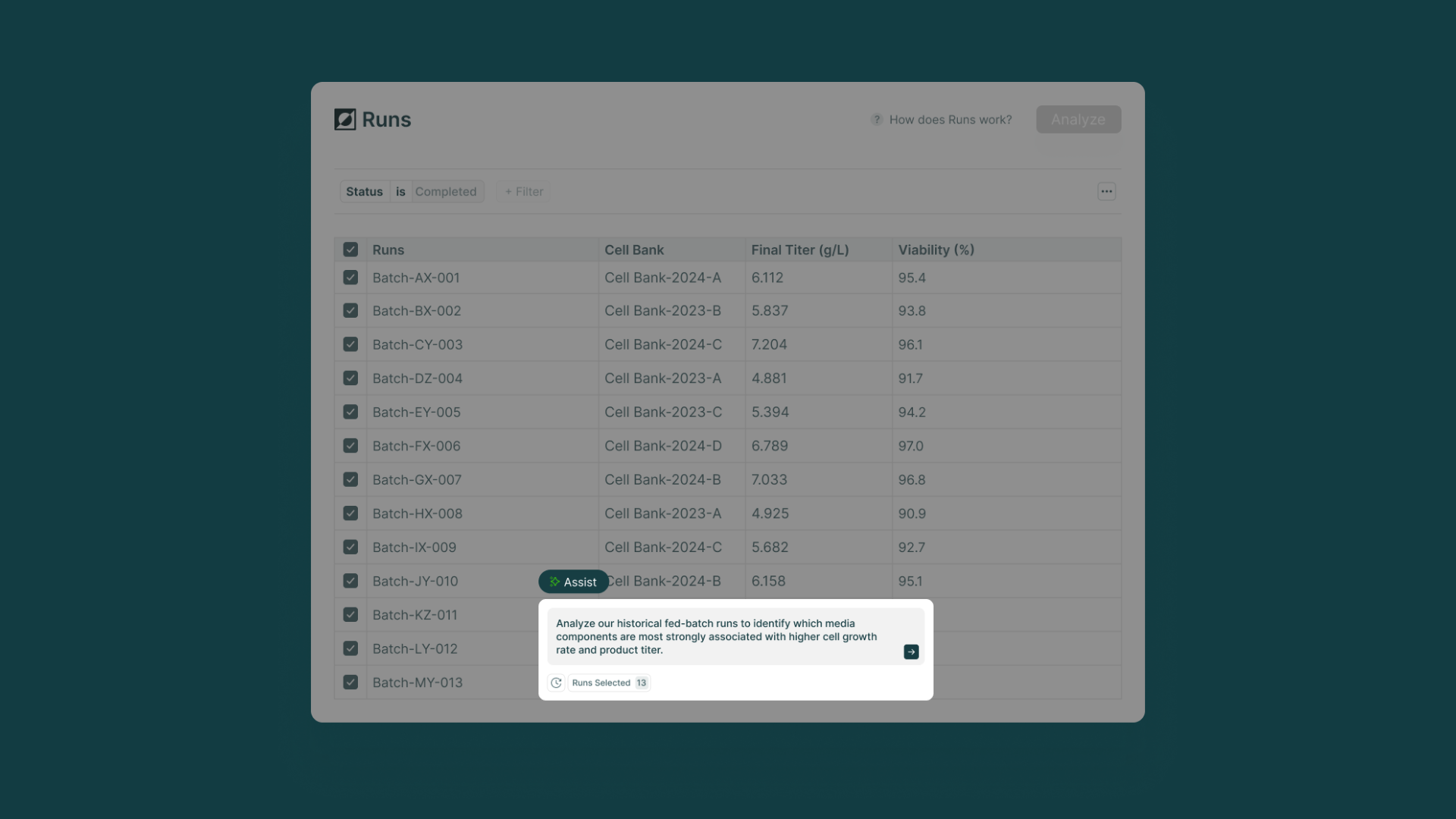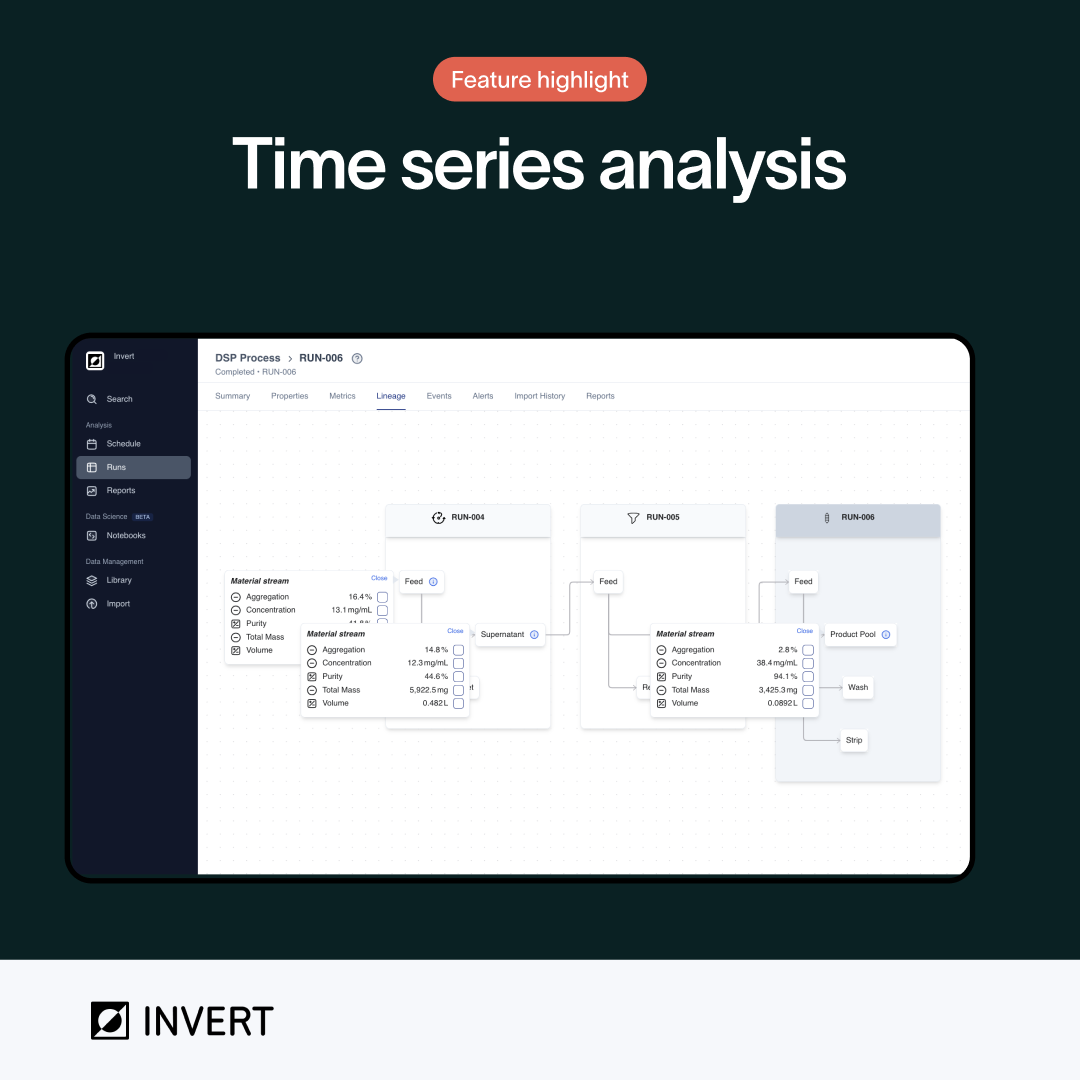Introducing Invert Assist — Explainable AI for Bioprocess Quality Control, Monitoring, and Optimization

In biopharma, teams don’t fail at AI because the models are weak. They fail because the data isn’t ready. That was the starting point of our latest webinar, where Emily Nault, Senior Vice President of Commercial, and Masaki, Head of Product at Invert, introduced Invert Assist, the new explainable AI assistant purpose-built for bioprocessing. Together, they demonstrated how Invert Assist, built on top of Invert’s trusted bioprocess data foundation, transforms fragmented bioprocess information into clear, auditable insights that accelerate development and strengthen bioprocess quality control.
The Data Problem Behind Most Enterprise AI Failures
As Emily explained, most enterprise AI projects — especially in pharmaceutical manufacturing — stall not because algorithms underperform, but because the underlying data is fragmented, inconsistent, and incomplete. Bioreactors, DSP systems, and CDMO data live in disconnected silos. Scientists can spend an undesireably large fraction of their time cleaning, merging, and reconciling information before analysis even begins. By the time data is aligned, the insight window has passed, milestones slip, and opportunities are lost.
Invert was built to eliminate that barrier. Acting as a bioprocess data integration platform, it connects instruments, systems, and sites, continuously unifying and contextualizing time-series data in real time. Every measurement and every parameter is harmonized, versioned, and traceable — creating a single source of truth that’s AI-ready and built for regulatory-grade data stewardship. As Masaki put it, “It’s not a data lake. It’s not a LIMS. It’s a data foundation, designed specifically for bioprocessing.”
Introducing Invert Assist: AI That Shows Its Work
Once data is unified and reliable, intelligence can finally be layered on top. Invert Assist represents the next evolution — a chat-based AI assistant for bioprocessing that helps scientists, engineers, and operations teams move from raw data to real decisions. With Assist, users can ask natural-language questions like “What caused the drop in yield last week?”, “Which parameters most affect titer?”, or “What experiments should we run next?”
Unlike generic AI tools, Invert Assist is fully explainable. It doesn’t just provide answers — it shows how it got there. Each analysis generates transparent, reproducible code that users can inspect, edit, rerun, and export for audit. Every interaction is logged and version-controlled, ensuring traceability for teams working under GxP and 21 CFR Part 11 requirements. “It’s not a black box,” Masaki explained. “We’re generating code that runs on your own data, so you can verify every step.”
Seeing Explainable AI in Action
During the live demo, Emily and Masaki showed how Invert Assist turns days of manual analysis into minutes of insight. They explored a series of fermentation runs, quickly identifying a pH deviation that impacted titer. What would have previously required manual data stitching across multiple systems was solved in a few queries, with Assist pulling in the harmonized data, highlighting correlations, and explaining its reasoning step-by-step.
They then moved to a design of experiments dataset, asking Assist which factors most impacted yield and what experiments should be run next. In seconds, the assistant identified pH as the dominant driver and proposed optimization runs, a clear example of how AI-driven bioprocess optimization platforms like Invert can help pharmaceutical manufacturing teams move from reactive troubleshooting to proactive process design.
Data Security and Compliance Built In
AI is only as valuable as the trust behind it, and that includes data security. Invert Assist operates within each customer’s isolated, secure environment. No data is ever shared across clients, and no customer data is used to train or fine-tune models. Invert runs its AI through Amazon Bedrock for added security, ensuring that intellectual property and sensitive process data remain fully protected.
Every query, every analysis, and every generated code block is logged and auditable, giving QA, IT, and regulatory teams full visibility into how results were produced. This governance-first design makes Invert Assist not just an analytics layer, but a cornerstone of bioprocess quality control and compliance.
Continuous Benchmarking and Evolution
Invert Assist isn’t static software, it evolves with science. As Masaki shared, the product team continuously benchmarks the assistant against real-world bioprocess questions: correlating parameters with yield drift, comparing scale-up runs to development batches, and refining the assistant’s accuracy and reproducibility over time. Each release is tested against structured evaluations, ensuring continuous improvement aligned with how scientists actually work.
Looking ahead, Invert is extending Assist’s capabilities from analysis to prediction. The next generation will integrate process modeling including mass transfer, regression-based, and hybrid models, to help scientists predict outcomes like titer, viability, and metabolite levels before running experiments. In short, Invert Assist will help teams design smarter experiments, reduce wasted runs, and optimize performance based on predictive reasoning, all within the same explainable, auditable framework.
Why It Matters
The combination of Invert’s real-time bioprocess monitoring foundation and explainable AI layer sets a new standard for how pharmaceutical manufacturing teams can approach process intelligence. For scientists, it means fewer hours wasted on data wrangling and more time focused on innovation. For executives, it means faster, data-backed decisions with reduced risk. And for IT and compliance leaders, it means an enterprise-grade architecture that aligns with governance, privacy, and auditability requirements from day one.
As Emily concluded, “We’re moving from reactive to proactive — from what happened to what matters.”
See the Full Webinar
To watch the complete demonstration, including live examples of explainable AI analyzing real bioprocess data, check out the full recording below:
The Bottom Line
Invert Assist delivers what the industry has been missing: a bioprocess AI software that’s transparent, secure, and built for the realities of manufacturing scale-up. By combining real-time bioprocess data integration, AI-driven optimization, and enterprise-grade compliance, Invert is redefining what’s possible in bioprocessing intelligence.
Because waiting and guessing are no longer options.
.png)
Engineer Blog Series: From Bioprocess to Software with Anthony Quach
Welcome to Invert’s Engineer Blog Series — a behind-the-scenes look at the product and how it’s built.In this post, software engineer Anthony Quach shares how his career in bioprocess development led him into software, and how that experience shapes the engineering decisions behind Invert.
Read More ↗
Connecting Shake Flask to Final Product with Lineage Views in Invert
Invert’s lineage view connects products across every unit operation and material transfer throughout the entire process. It acts as a family tree for your product, tracing its origins back through purification, fermentation, and inoculation. Instead of manually tracking down the source of each data point, lineages automatically show material streams as they pass through each step.
Read More ↗
Engineer Blog Series: Security & Compliance with Tiffany Huang
Welcome to Invert's Engineering Blog Series, a behind-the-scenes look into the product and how it's built. For our third post, senior software engineer Tiffany Huang speaks about how trust and security is a foundational principle at Invert, and how we ensure that data is kept secure, private, and compliant with industry regulations.
Read More ↗